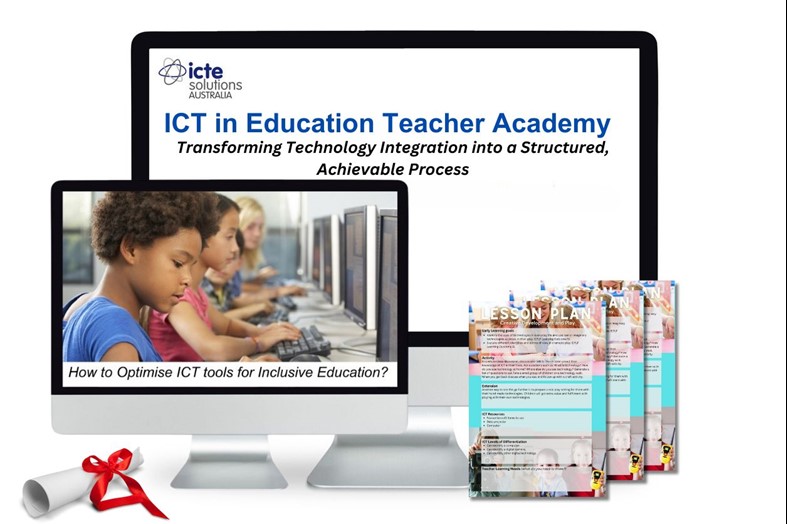How Can I Include Everyone If I Only Have One Device?
Leah had always been passionate about early childhood inclusion. But in her third year of teaching, she began to feel that passion wasn’t enough.
She looked around her classroom—so many needs, so many diverse little humans—and just one Bee-Bot, one laptop, and an old desktop computer.
There was the child with delayed speech who found it difficult to contribute in group discussions. The newly arrived learner who spoke little English. A child with a motor delay who often felt left out of hands-on tasks. And then the rest of the group—each with their own quirks, strengths, and learning styles.
Leah believed in inclusion in early childhood education, but she constantly questioned herself:
Am I really supporting everyone? Am I using the right strategies? Is there more I should be doing?
She spent evenings scrolling through Pinterest, saving activity ideas. But the deeper she went, the more overwhelmed she became. She wasn’t short on inspiration—she was short on time, guidance, and confidence. What she really needed wasn’t another idea. She needed a way to know if what she was doing was actually helping.
Still, she hesitated.
She had seen the ICT in Education Teacher Academy pop up in her feed a few times. It looked promising—done-for-you lesson plans, a professional community, and a workbook that helped you track your growth. But a voice inside her questioned:
Is this just another resource I’ll download and forget about? Will this really help me in my classroom, with my learners and limited tech?
She wasn’t ready to join. Not yet.
Instead, she signed up to read a blog—just like you did. It was about inclusive practices in ECE, and it hit home. The way the article described the little things—being unsure how to use technology meaningfully, feeling the pressure to differentiate with too few tools, wanting to do better but not knowing where to start—it felt like someone had written it just for her.
At the bottom of that article, there was an invitation to download a free workbook sample.
“This isn’t just a resource,” it said. “It’s a roadmap.”
Leah hesitated again. But this time, she clicked.

Why Is Inclusion So Difficult Without Practical Support?
That first page of the workbook asked Leah to reflect:
-
Who gets access to the ICT in your room?
-
What barriers might certain learners face?
-
What might you do differently with what you already have?
These weren’t technical questions. They were personal. And they struck a nerve.
Leah had always believed in inclusive education in early childhood settings, but now she could see the gap between her intentions and her tools.
The workbook didn’t give her a list of “right answers.” Instead, it helped her uncover her own. That’s what gave her the confidence to finally take the next step and become a member.
Not because she had it all figured out—but because she was finally ready to learn how to use ICT in early childhood education in ways that truly promoted inclusion.
Can You Really Make Inclusion Work with Just One Device?
One of Leah’s biggest concerns was whether she had enough technology to make a difference.
Her first question inside the Wisdom Tool said it all:
“How do I make learning inclusive when I only have one Bee-Bot?”
The answers were immediate—and practical:
-
Rotate children through small-group tech-based learning areas.
-
Use U-shaped layouts to give all children better visual access to digital tools.
-
Select activities where children control the technology—not the other way around.
-
Embed the Bee-Bot into storytelling, social-emotional learning, and group projects.
None of the advice required buying more gear. It was about using what she had—thoughtfully, strategically, and with inclusion at the centre (Learning about computers activity).
What Does ICT in Preschool Really Look Like When Inclusion Is the Goal?
Before joining, Leah’s understanding of ICT in preschool was limited. She thought it was occasional tablet time or an alphabet game.
But the Academy changed that.
She learned that ICT in early childhood education includes:
-
Digital drawing and painting tools, helping children with motor delays express themselves in ways they can control.
-
Voice recording apps for children who are non-verbal or learning English, allowing them to participate in storytelling or group discussions.
-
Photography and augmented reality for sensory exploration, making science and inquiry more accessible to children with diverse learning needsDigital nature walk and…Augmented Reality outdo….
-
Programmable toys like Bee-Bots used in collaborative challenges where all children, regardless of ability, contribute ideas and decisionsProblem solving activit….
ICT wasn’t replacing play—it was extending it.
And because the membership provided:
-
Tiered ICT levels of differentiation,
-
A community of educators sharing adaptations,
-
And a reflective workbook to guide practice,
Leah felt confident that her ICT use was purposeful, child-centred, and inclusive.
How Do You Know Your Inclusion Strategies Are Working?
For Leah, inclusion was always a value—but values don’t assess themselves.
She didn’t just want to feel like she was supporting all learners with technology. She wanted to know—with clarity and evidence—that her ICT strategies were reaching every child in her care.
This desire—to move from assumption to assurance—is one that many early childhood educators share. And it’s exactly where the ICT in Education Teacher Academy membership workbook became Leah’s most valuable tool.
Step 1: Self-Assessment Revealed the Gaps
Leah began with the ICT Self-Assessment section in the workbook, designed to determine her starting point along the Technology Integrator’s Success Path.
By reflecting on areas like:
-
Ensuring equal access to ICT for all children,
-
Using ICT to support language, creativity, and collaboration,
-
And planning lessons that adapt ICT to diverse learning needs,
…she scored herself across a 1–3 scale. Her overall score placed her in the Adaption stage—meaning she was experimenting, but not yet confident in adapting technology purposefully for inclusion.
Already, she had uncovered an important insight: inclusion with ICT isn’t just about having the right beliefs. It’s about matching those beliefs with intentional, measurable action.
Step 2: Planning with Inclusion in Mind
From that point forward, Leah used the Printable Early Childhood Lesson Plan Template included in the workbook to ensure every ICT activity reflected inclusive design.
She specifically relied on:
-
The ICT Levels of Differentiation section to plan for beginners and more advanced users of technology,
-
The Ideas for Adapting to My Context prompts to modify lessons based on her available tech and classroom makeup,
-
And the Inclusive Learning Needs section, which helped her intentionally plan for students with physical, communication, or sensory needs.
Instead of simply “including” all learners, she began designing for them from the start.
Step 3: Observing and Reflecting Using Targeted Prompts
To assess how her ICT strategies were working in practice, Leah used the workbook’s:
-
Critical Reflection & Observation prompts, which guided her to ask:
-
Did this ICT activity engage learners at multiple levels?
-
What barriers did I notice for any child?
-
How did I adapt in the moment—and what will I do next time?
-
She paired this with the Challenges Log, recording situations where ICT either enhanced or impeded learning. One log entry described how a digital storytelling activity succeeded with most learners—but left one EAL child unsure how to participate. Leah noted the challenge and, using the Wisdom Tool, discovered a member-shared strategy involving photo-based storytelling with translated prompts. The next week, she tried it—and the child beamed with pride as he narrated his first story using images and voice.
This process didn’t just make inclusion visible—it made it dynamic.
Step 4: Capturing Evidence to Align with Professional Growth
Leah also used the workbook’s APST-aligned templates to collect formal evidence of inclusive ICT teaching practice. This included:
-
2.6.2 (Use effective ICT strategies to make content meaningful): She attached reflections from her adapted Bee-Bot storytelling lessons.
-
3.3.2 (Select strategies to foster creativity and problem-solving): She documented how she tailored activities for different learning profiles.
-
4.5.2 (Promote safe, responsible ICT use): She used the digital safety milestone to design a lesson plan teaching ethical tech behavior in her classroom.
Over time, her completed Success Path Milestones became a portfolio—not just of progress, but of purposeful, inclusive teaching.
Why It Matters
What Leah learned—and what the membership helps educators like her discover—is this:
Inclusion with ICT isn’t achieved through good intentions or occasional adaptations. It requires:
-
A framework that guides your thinking,
-
A toolkit that supports your planning and assessment,
-
And a professional learning space that provides answers, community, and next steps.
Through the Membership Workbook, Leah didn’t just try new things—she built a practice grounded in evidence, reflection, and real-world impact.
And now, she knows—with certainty—that her use of ICT in early childhood education isn’t just engaging. It’s inclusive.
Can One Inclusive Activity Really Change the Way You Teach?
It was a simple idea: “Turning the Bee-Bot into a Butterfly”Problem solving activit….
Each child made a flower using different materials—some digital, some tactile. The Bee-Bot was programmed to visit each flower, “pollinating” them one by one.
-
A child with limited speech placed her flower with confidence.
-
A child with motor difficulties gave the directional commands, while a peer pressed the buttons.
-
A child new to English narrated the Bee-Bot’s journey using voice recordings.
Every child participated. Every child belonged.
And Leah realised—it wasn’t about what she had. It was about what she did with it.
Where Can Educators Learn to Use ICT for Inclusion in ECE?
Leah stayed in the membership because it gave her:
-
The Wisdom Tool—a place to ask real questions and get real answers.
-
A community where she could share challenges, celebrate wins, and grow with others.
-
Lesson plans that were developmentally appropriate, curriculum-linked, and inclusive by design.
-
A structured workbook that made her planning more reflective and her teaching more intentional.
The membership didn’t just help her use ICT.
It helped her transform how she saw inclusion—and how she made it real for every child in her care.

10 Things that make ICT Great for Inclusion in ECE
Inclusion in early childhood education means increasing the participation of children in the cultures, curriculum and communities of local schools. It concerns being able to support the needs of all children. Having an inclusive environment is essential in offering opportunities for learning for children and you as an early childhood teacher want all children to benefit. The use of ICT in early childhood education is a vital tool that ensures that inclusion actually happens.
Here are a number of ways that ICT can create an inclusive classroom (North & McKeown, 2005):
1 . Children find computers and any other form of ICT device to be motivating.
2. Text, graphics or sound can be accessed through multimedia and this can account for individual learning styles and strengths.
FACT: ICT can aid to moving from integration to inclusion. However, you need to ensure that you and your staff are developing inclusive practices at your early childhood centre.
3. There is a lot of software that combines colour, pictures, animations, sound and humour which can grab the children’s attention who are turned off by group work and listening.

4. Social interaction is ripe when ICT is integrated effectively as children can work together around the computer focusing on the learning task. This enables them to develop their language and social skills in addition to learning from their peers.
5. Many keyboards offer access to word processing so that work is legible.
6. Predictive packages can make the difference between thoughts in the head and words on the page.
FACT: E-inclusion is based on the social model of inclusion where learning difficulties are created by the social context.
7. Spell checkers are a great way to help children learn to spell if used correctly and can make a difference between chaos and meaning.
8. Assistive technology is a form of ICT device that helps children with physical, sensory and learning difficulties overcome barriers.
9. Drawing tools allow early childhood teachers to develop and provide visual instruction sheets for children who have problems getting information from listening or reading.
FACT: It is important that you understand the demands placed on children in steps of planned, technology-supported activities if you are to ensure that children with disabilities are included.
10. Don’t forget about the power of the digital camera that allows children to record experiences and achievements in a very immediate way.

Optimising ICT for Inclusive Learning
In the 21st century, there are many ICT tools to choose from. However, when we think of it we mostly envisage images of computers and data projectors. As teachers, we need to think how we can ensure an inclusive education for everyone and ICT tools for teaching and learning is your best option.
From the start, UNESCO defines inclusive education as the following:
"Inclusive education is about putting the right to education into action by reaching out to all learners, respecting their diverse needs, abilities and characteristics and eliminating all forms of discrimination in the learning environment."
Achieving the effective use of ICT in inclusive education can begin with you as the teacher considering the environment. Now even though not all of us will work in a new school, these questions can set the foundation for ensuring that ICT in inclusive education is an important part of your strategies.
- Does the layout support or restrict good ICT provisions?
- Is there room for all students to work at computers with paper etc. beside the keyboards?
- Can you as the teacher walk around and easily see what each student is doing?
- Can you demonstrate work on a computer screen to the whole class?
(North and McKeown, 2005)
Organising ICT in your room
Education is for all and it is the key to changing the world. Before you change the world, change the classroom first. By organising ICT in the classroom effectively, you not only make a considerable difference to the potential of ICT capability but also to enhance the use of ICT in inclusive education.
First, you need to think about how students will around the room as children with poor motor control need clear spaces. Ensure that you never leave bags and coasts in the ICT rooms.
The layout of the room needs to always be considered and the equipment of the room needs to be considered for especially those students with SEN. Unobstructed access into and around the room is vital so as not to create any mobility challenges.
You also need to group students in a U shape or horseshoe shape for class discussions or demonstrations. If you have a large room where computers are situated around the edge this strategy is of particular importance.
Key examples
To give you an idea of what exactly I am talking about when discussing about ICT in inclusive education, here is a list of ICT that is great for the inclusive classroom:
- Interactive whiteboards – easier to integrate sound and video as part of the lesson. Colour and pictures can reach out to a wider range learning styles.
- Computer;
- iPads and tablet computers;
- digital cameras and recorders;
and so on.
I could go on, but ICT in inclusive education includes all that we already use and integrate into our teaching and learning today.
Despite this, ICT in inclusive education in early childhood, primary and secondary is entirely dependable on you ensuring as a teacher that you will have a good ICT lesson. So the following will prove useful to you:
- Before – careful planning to cover content and set clear objectives. You will also need to plan for additional, supplementary or alternative activities.
- Opening the lesson – whole class activities and questioning. Setting the pace and organising the groups.
- Developing the lesson – a mix of computer and non-computer activities as appropriate.
- End – make sure that everyone has seen the whole as well as the parts. Allow students to see other students’ work.
Helping Every Child Participate Through Technology
Many early childhood educators are asking this essential question: What is ICT in early childhood education, and how can it support inclusive teaching practices?
ICT stands for Information and Communication Technology. In preschool and early years settings, this doesn’t mean handing children a computer and asking them to type. It means using a wide variety of age-appropriate digital tools and devices to support communication, expression, problem-solving, and learning.
When used intentionally, ICT in preschool becomes a powerful way to create inclusive learning environments where every child can participate in their own way. Whether they are non-verbal, have motor skill challenges, or are learning English as an additional language, ICT can offer alternative modes of communication, engagement, and creativity.
Common Examples of ICT in Early Childhood Education:
-
Programmable Toys (e.g., Bee-Bots): Support problem-solving and sequencing.
-
Drawing and Painting Apps: Help children with fine motor delays express themselves digitally.
-
Digital Cameras or Tablets: Enable children to document learning, tell stories visually, or create photo-based projects.
-
Voice Recorders: Allow non-verbal or multilingual children to participate through oral storytelling or responses.
-
Augmented Reality: Supports sensory and exploratory learning.
-
Interactive Whiteboards: Offer group collaboration opportunities and visual learning experiences.
How the ICT in Education Teacher Academy Supports This
Inside the ICT in Education Teacher Academy, members don’t just get access to ideas—they get ready-to-implement lesson plans that show how to use these ICT tools inclusively and meaningfully.
Here are just a few inclusive ICT activity examples from the membership:
-
"Drawing with Programmable Toys": Children create abstract art using Bee-Bots. Those with fine motor challenges participate by coding rather than drawing.
-
"Sorting Animals with Digital Cameras": Children photograph animal toys or real pets, sort them digitally, and explain their groupings using voice recordings.
-
"Outdoor Digital Storytelling": Combines nature walks with photography and narration. EAL learners use images and sounds to tell stories in their own language.
Every activity is designed with inclusive outcomes in mind.

Using the Wisdom Tool to Adapt to Your Context
One of the most valuable features of the membership is the Wisdom Tool. Members use it to ask questions like:
-
*"What can I do with one Bee-Bot and a group of 15?"
-
*"How do I include a non-verbal child in ICT activities?"
-
*"Can I run a lesson with just a tablet and no internet?"
The Wisdom Tool instantly links members to relevant lesson plans, workbook sections, and community-shared tips. It’s not just about giving answers—it’s about building professional confidence to apply ICT for inclusion.
The Bigger Picture: ICT for Inclusive Education
When we ask, "What is ICT in early childhood education?" the answer is simple:
It’s not about devices. It’s about choices.
It’s about giving children multiple ways to learn, communicate, and be included.
And with the support of the membership—lesson plans, the workbook, the community, and the Wisdom Tool—early childhood educators are no longer left wondering what to do.
They know exactly where to start.
Join the ICT in Education Teacher Academy today and begin using ICT to build a more inclusive classroom, one tool and one learner at a time.
7 inclusive practices in early childhood education
1. Consider the impact of a range of factors on learning and development.
For example, you can observe carefully how gender can impact learning especially when it comes to ICT use. You can use this information to aid the evaluation of provisions and areas can be changed to appeal to both girls and boys.

2. Be aware of the relationship between social deprivation and underachievement.
3. Develop a positive relationship with parents and carers to establish the needs of the needs of the child.
The family is such a rich source of information. The information you gather from them will help you to provide appropriate provision for the child from the beginning.
4. Reflect on your own value system as inclusion and values go very much hand in hand.
Reflect on your own values as it will affect the commitment you put into developing inclusive practices. Be highly reflective and be willing to make adaptions to your practices.

5. Embrace the social model of disability.
This model distinguishes between disability and impairment with the key assumption that within-child factors only become disabling in certain situations. Disability is only there if society does make adjustments to provision.
6. Be flexible.
This is the key to achieving an inclusive ethos and this includes policies, practices and routines that need to be changed if they do not meet the needs of specific learners.

7. Plan for careful observational assessment.
Even the SEN children can have the same effective approach as for other children. This is crucial! Be prepared to try new strategies and to evaluate them. This will enable you to evaluate how well children have responded to specific interventions and you may find that a cycle of plan, do and review is useful. Remember that no one will expect you to plan interventions alone but you are expected to be able to work in partnership with other staff in the setting, with parents and carers. Listen carefully to the recommended strategies suggested by staff representing different agencies.

What’s Your First Step Toward Inclusion with ICT?
If you’ve been wondering:
-
How can I include every child when I only have limited tech?
-
Where do I find inclusive strategies that work in real early childhood settings?
-
Am I doing enough—or just doing my best to keep up?
Then maybe this blog is more than just an article.
Maybe it’s your moment—just like it was for Leah.
You don’t need more ideas. You need the support to make them meaningful.
Join the ICT in Education Teacher Academy and discover how your next step can lead to something transformative—for you and for every learner in your classroom.
$20 per month or pay annually for $200 per year (2 months FREE)






